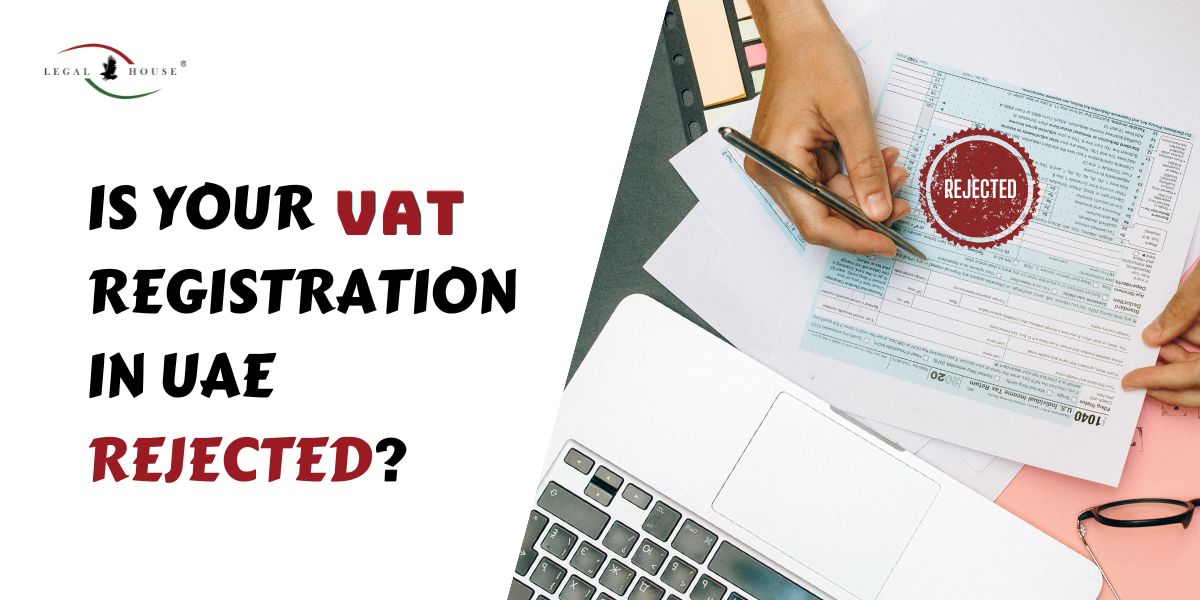Is your vat registration in UAE rejected?
This is a question that many people ask and are not aware of the consequences that can follow if they do not comply with these rules. The UAE has very strict rules and regulations when it comes to VAT registration. If you are a business owner, then it is your responsibility to ensure that all necessary documents are submitted on time and without any errors. If there is an error in any document, then your VAT(Value Added Tax) registration could be rejected. In this post, you will find comprehensive information on the process of VAT registration in Dubai UAE.
New companies in the UAE are required to register for VAT if their taxable supplies and imports exceed AED 375,000 per annum. It is important for businesses to submit all the necessary documents on time and without any errors to ensure a smooth registration process. The documents required for VAT registration in the UAE include a valid trade license, identification documents of the owner and authorized signatories, and financial statements, among others. New companies should also ensure that they understand the VAT laws and regulations in the UAE and appoint a tax agent if necessary to assist them with the registration process.
why your vat registration in UAE was rejected?
If you have submitted your VAT registration application in UAE and it has been rejected, you may have a simple solution. The UAE government has strict rules regarding VAT registration and they have set certain criteria which must be met before a company can register with them. The first thing you should do is check the reasons for rejection. If it was because of an error on your part, then you can fix that and re-apply. The following are some of the reasons why your company may not qualify for VAT Registration:
- You may not have a valid business license.
- You haven’t been operating for at least three months in the country. If you have just recently started operations in the UAE, you must wait for at least three months before applying for VAT registration. If you apply too soon, chances are that your registration will be rejected since there is no way to check how long you have been operating in the country. and also VAT registration will not be permitted if you have incurred any penalties from the FTA.
- You have not registered for vat in the same location as your business.
- You may not have a business bank account in UAE.
- Your company is not registered in the trade register of Dubai or UAE.
- You may submit Incomplete documents for verification.
At Legal House, We are a team of legal consultants helping people in the UAE with VAT registration. We provide assistance for businesses to register for VAT and help them fill out the forms. We also provide advice to businesses who want to opt out of VAT registration, as well as advice on how to avoid any fines or penalties from the government. here’s what we can do for you:
- We’ll help you complete the application and make sure it’s done correctly.
- We’ll help you collect all the necessary documents and verify them.
- We’ll guide you through the entire process of getting your vat registration in UAE processed quickly and efficiently.
Feel free to touch with us for any doubts you have. we also do legal consultations on the company formation process and other business legal issues.
FAQ:
If a business’s taxable supplies and imports exceed AED 375,000 per year, VAT registration is mandatory, but if they exceed AED 187,500 per year, registration is optional. The business is obligated to collect tax from customers and remit it to the government, but they can also obtain a refund from the government for the tax paid to suppliers. Moreover, foreign businesses can reclaim the VAT they incurred while visiting the UAE.
The most asked documents are a trade license, passport copy, emirates ID, and any other authorized documents needed to do your business in UAE.
If you do not have a VAT number yet, you can still invoice or bill your customers. However, your invoice should clearly state that your business is not yet registered for VAT and does not have a VAT number. It is important to ensure that your invoice complies with all other requirements for invoicing in the UAE, such as including the date of the invoice, a unique invoice number, a description of the goods or services provided, the total amount payable, and your business’s details, such as name, address, and contact information. Once your business is registered and has a VAT certificate UAE, you will need to issue new invoices with the appropriate VAT details and numbers.
As a VAT-registered business in the UAE, you can recover the VAT that you have paid to your suppliers by claiming an input tax credit on your VAT return. To claim the input tax credit, you must ensure that the tax invoice received from your supplier contains all the required information, such as the supplier’s name, address, VAT number, the date of the invoice, a unique invoice number, a description of the goods or services supplied, the amount charged, and the amount of VAT charged.
You should maintain proper records of all tax invoices and ensure that they are correctly entered in your VAT return. In your VAT return, you can deduct the input tax amount from the output tax amount that you have collected from your customers. If the input tax amount is more than the output tax amount, you can carry forward the excess input tax amount to the next VAT return or request a refund from the Federal Tax Authority (FTA). It is important to ensure that you comply with all VAT laws and regulations in the UAE to avoid any penalties or fines.







Keep up the great work, as your blog is truly a standout resource for those seeking insights and understanding.